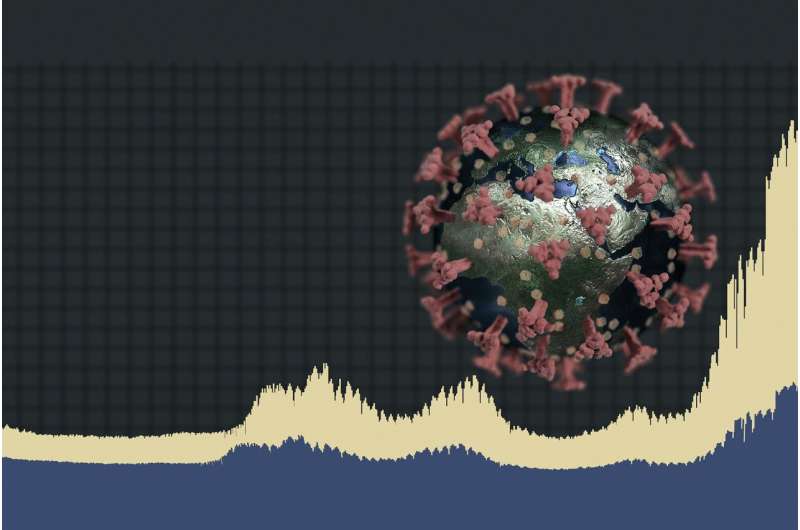This article has been reviewed according to Science X's editorial process and policies. Editors have highlighted the following attributes while ensuring the content's credibility:
fact-checked
peer-reviewed publication
trusted source
proofread
Comprehensive study provides evidence on natural immunity protection by COVID-19 variant, how it fades over time

For someone previously infected with COVID-19, their risk of hospitalization or death is 88% lower for at least 10 months compared to those who had not been previously infected, according to a systematic review and meta-analysis published in The Lancet.
The analysis also suggests that the level and duration of protection against reinfection, symptomatic disease and severe illness is at least on a par with that provided by two doses of the mRNA vaccines (Moderna, Pfizer-BioNtech) for ancestral, alpha, delta and omicron BA.1 variants. The study did not include data on infection from omicron XBB and its sublineages.
"Vaccination is the safest way to acquire immunity, whereas acquiring natural immunity must be weighed against the risks of severe illness and death associated with the initial infection," says lead author Dr. Stephen Lim from the Institute for Health Metrics and Evaluation (IHME) at the University of Washington's School of Medicine, U.S..
As IHME co-author Dr. Caroline Stein explains, "Vaccines continue to be important for everyone in order to protect high-risk populations such as those who are over 60 years of age and those with comorbidities. This also includes populations that have not previously been infected and unvaccinated groups, as well as those who were infected or received their last vaccine dose more than six months ago. Decision makers should take both natural immunity and vaccination status into consideration to obtain a full picture of an individual's immunity profile."
Since January 2021, several studies and reviews have reported the effectiveness of past COVID-19 infection in reducing the risk of reinfection and how immunity wanes over time. But none has comprehensively assessed how long the protection after natural infection will last and how durable that protection will be against different variants.
To provide more evidence, the researchers conducted a review and meta-analysis of all previous studies that compared the reduction in risk of COVID-19 among non-vaccinated individuals against a SARS-CoV-2 reinfection to non-vaccinated individuals without a previous infection up to September 2022.
It included 65 studies from 19 countries and evaluates the effectiveness of past infection by outcome (infection, symptomatic disease, and severe disease), variant, and time since infection. Studies examining natural immunity in combination with vaccination (i.e., hybrid immunity) were excluded from the analyses.
Immunity fades over time
Analysis of data from 21 studies reporting on time since infection from a pre-omicron variant estimated that protection against reinfection from a pre-omicron variant was about 85% at one month—and this fell to about 79% at 10 months. Protection from a pre-omicron variant infection against reinfection from the omicron BA.1 variant was lower (74% at one month) and declined more rapidly to 36% at around 10 months.
Nevertheless, analysis of five studies reporting on severe disease (hospitalization and death) found that protection remained universally high for 10 months: 90% for ancestral, alpha, and delta, and 88% for omicron BA.1.
Six studies evaluating protection against omicron sub-lineages specifically (BA.2 and BA.4/BA.5) suggested significantly reduced protection when the prior infection was pre-omicron variant. But when the past infection was omicron, protection was maintained at a higher level.
"The weaker cross-variant immunity with the omicron variant and its sub-lineages reflects the mutations they have that make them escape built-up immunity more easily than other variants," says IHME co-author Dr. Hasan Nassereldine. "The limited data we have on natural immunity protection from the omicron variant and its sub-lineages underscores the importance of continued assessment, particularly since they are estimated to have infected 46% of the global population between November 2021 and June 2022. Further research is also needed to assess the natural immunity of emerging variants and to examine the protection provided by combinations of vaccination and natural infection."
The researchers note some limitations of their study, cautioning that the number of studies examining the omicron BA.1 variant and its sub-lineages and the number from Africa was generally limited. In addition, only limited data were available beyond 10 months after the initial infection. They also note that some information, such as past infection status and hospital admissions, was measured differently or incomplete, and could bias the estimate of protection.
Writing in a linked Comment, Professor Cheryl Cohen, National Institute for Communicable Diseases, South Africa, who was not involved in the study, says, "The high and sustained levels of protection conferred by previous infection against severe disease have important implications for COVID-19 vaccine policy. By September, 2021, global SARS-CoV-2 seroprevalence was estimated at 59%, with substantial variation in the proportion of immunity induced by infection or vaccination in different settings. Seroprevalence in Africa was estimated at 87% in December, 2021, largely as a result of infection.
"High levels of immunity are an important contributor to the lower levels of severity observed with infection caused by emerging omicron subvariants. As SARS-CoV-2 epidemiology shifts to more stable circulation patterns in the context of high levels of immunity, studies of the burden and cost of SARS-CoV-2 infection and risk groups for severe disease are needed to guide rational vaccination policy and decisions around prioritization in relation to other vaccine preventable diseases."
More information: Past SARS-CoV-2 infection protection against re-infection: a systematic review and meta-analysis, The Lancet (2023). www.thelancet.com/journals/lan … (22)02465-5/fulltext



















